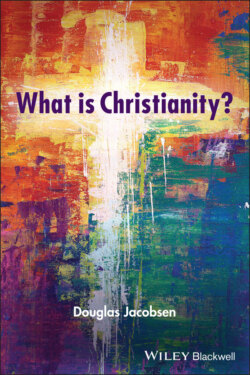Читать книгу What is Christianity? - Douglas Jacobsen - Страница 12
Christianity’s Original Diversity
ОглавлениеDuring the first two centuries of its existence, Christianity remained a small religious movement with no discernible center or governing structure. Groups of Christians in different locations held widely varying opinions about almost every aspect of the movement, including who Jesus was, what salvation entailed, how the movement was related to Judaism, when and how the world would end, which sources of authority should guide the movement, and how the movement should be organized. The Bible had not yet been compiled, and institutional church structures were weak or nonexistent. It was a movement led by charismatic, often self-appointed, individuals who sometimes had conflicting visions for the movement’s future. Even at the local level, Christians had their differences. In the Apostle Paul’s first letter to the Corinthians, he indicates that many Christians in that city looked to a person named Apollos as their main guide and teacher, others looked to Peter, some followed Paul himself, and a few apparently claimed direct access to Christ with no need for any human teacher. Unanimity was clearly not the norm.
A short book called the Didache (meaning “teaching”), written around the year 100, advised early Christians about how to conduct themselves in this diverse and fluid environment. One immediate concern was evaluating the many wandering Christian prophets and preachers who traveled from town to town, providing instruction and seeking support from local Christian communities. The Didache says these peripatetic prophets should initially be welcomed as fellow believers, but they should be designated as false teachers if they stayed too long (more than two nights), if they asked for money or food, or if they failed to follow their own guidance. The document’s advice on baptism is similarly practical and flexible. Instead of mandating one specific mode of baptism, the Didache says it is best to baptize individuals in a cold spring-fed stream, but if a stream is not available, then a cold lake or pool will do; if cold water cannot be found, then warm water is satisfactory; and if there is not enough water for full immersion, then pouring water over a person’s head will suffice. Early Christianity was adaptable, and Christians felt little need to endorse just a single way of doing anything.2
Multiple versions of Christianity flourished alongside each other. Some Christian groups continued to insist that followers of Jesus needed functionally to become Jews and to obey the entirety of Jewish law. Other Christians adopted a position at the opposite extreme and condemned Judaism as thoroughly mistaken and evil. A person named Marcion, who grew up on the southern coast of the Black Sea and later moved to Rome, was the most prominent champion of this antisemitic perspective; he was also the first person to publish a collection of specially selected sacred Christian texts that prefigured the New Testament. Marcion’s compilation included the Gospel of Luke, the book of Acts, and most of Paul’s letters, but he removed anything in those texts that reflected favorably on Jews. Marcion and his antisemitic proto-New Testament were eventually rejected by the church in Rome where he was a member, but a separate Marcionite church continued to exist for several centuries. Another Christian group called the New Prophecy believed that God was still speaking directly to humankind through prophets whose words were as authoritative as those of Jesus. The movement was nominally led by a man named Montanus, but its prophetic oracles were both women, Prisca and Maximilla. Another significant subgroup of early Christians were called Gnostics, who delighted in formulating complex metaphysical descriptions of the universe and all the spiritual beings, both good and evil, that inhabit it. Gnostics claimed that Jesus had provided them with secret knowledge about how to negotiate their way through a complex and spiritually crowded universe after death and eventually make their way to heaven. The perspectives of Gnostics, Marcionites, members of the New Prophecy, and many others were all part of the early Christian amalgamation, and there was no central authority to adjudicate their conflicting claims.
